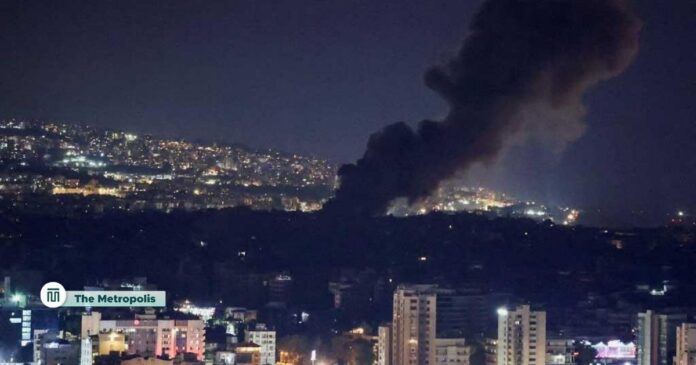As its military announced that troops had started “limited” raids against Hezbollah targets in the border area, Israel’s much anticipated ground invasion of Lebanon looked to be getting underway early on Tuesday.
In a statement, the military said that it had started “limited, localized, and targeted ground raids based on precise intelligence” against Hezbollah in villages near the border in southern Lebanon, saying that the group posed “an immediate threat to Israeli communities in northern Israel.”
The ground forces were receiving “precise strikes” from the air force and artillery, according to the statement.
In the border town of Aita al-Shaab, Lebanon, locals reported hearing helicopters and drones flying overhead, along with intense shelling. Flares illuminated the night sky over the Lebanese border town of Rmeish.
The next stage of the conflict along Lebanon’s southern border will start soon, Israeli Defense Minister Yoav Gallant announced on Monday. He also supported the goal of repatriating Israeli citizens displaced by Hezbollah rockets during nearly a year of border warfare.
A lethal raid into Israel by the Palestinian organization Hamas almost a year ago set off an increasingly dangerous Middle East conflict between Israel and militants backed by Iran, which the US and Iran are now worried about. The ground invasion reflects this conflict.
Following two weeks of airstrikes and the deadly detonation of booby-trapped Hezbollah pagers, Israel dealt one of the biggest blows to the organization in decades on Friday, killing Hezbollah chief Hassan Nasrallah.
I talk a lot about Iran’s leaders, but now, at this critical juncture, I want to speak to you, the Iranian people.
The Lebanese government reports that in addition to killing approximately 1,000 civilians and forcing one million people to flee their homes, the heavy airstrikes have eliminated several Hezbollah commanders.
The Israeli military had warned residents to evacuate areas near buildings it said contained Hezbollah infrastructure south of the Lebanese capital, but about an hour later, strikes struck Beirut’s southern suburbs, according to a security source. A Reuters reporter saw a flash of light and several loud blasts.
Early on Tuesday, Lebanon’s health ministry announced that Israeli strikes on the country’s southern regions, the eastern Bekaa Valley, and Beirut had resulted in at least 95 deaths and 172 injuries in the last 24 hours.
On Monday, in his first public speech since Nasrallah’s passing, Hezbollah’s deputy leader, Naim Qassem, declared that “the resistance forces are ready for a ground engagement.”
He claimed that Hezbollah was still firing rockets into Israeli territory, reaching a distance of 150 km (93 miles).
The war may last a long time, as we know. Speaking of the most recent major battle between the two enemies, “We will prevail as we succeeded in liberating 2006,” he declared.
Lebanese security sources told Reuters that late on Monday, troops withdrew from positions along Lebanon’s southern border with Israel, a distance of roughly five kilometers (3 miles). A spokesman for the Lebanese army did not confirm or deny the movement.
In the past year of hostilities, Lebanon’s army has refrained from taking part in major conflicts with Israel and has not fired on the Israeli military.
When contacted for comment on Israel’s ground operations in Lebanon, the US State Department and the White House did not answer right away.
Nonetheless, US President Joe Biden had demanded a cease-fire on Monday.
When questioned by reporters about his comfort level with Israeli plans for a cross-border incursion, Biden replied, “I’m more worried than you might know, and I’m comfortable with them stopping.” “We should have a ceasefire now.”
Last week, Israel turned down a US-French proposal for a 21-day cease-fire along the Lebanon border in order to facilitate a diplomatic resolution that would allow both sides’ displaced civilians to return home.



